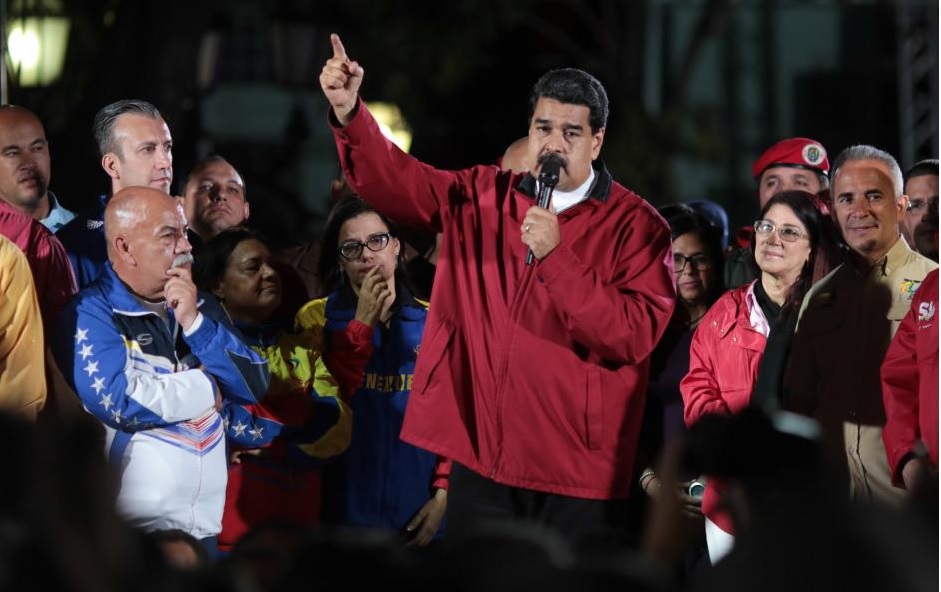CARACAS, (Reuters) – Venezuelan President Nicolas Maduro today celebrated the election of a new legislative superbody that is expected to give the ruling Socialist Party sweeping powers and mocked U.S. criticism that the vote was an affront to democracy.
At least 10 people were killed on Sunday in protests against the unpopular Maduro, who insists the new body known as the constituent assembly will bring peace after four months of protests that have killed more than 120 people.
Opposition parties sat out the election, saying it was rigged to increase Maduro’s powers. They decried the vote as a fraud and called on supporters to protest again as of midday.
Countries across the Americas, as well as the European Union, denounced the creation of the assembly, which will have the power to rewrite the constitution.
The United States – the top market for the OPEC nation’s oil – called the vote a sham, and officials in Washington said they were preparing oil-sector sanctions.
“A spokesperson for emperor Donald Trump said that they would not recognize the results of Venezuela’s constituent assembly election,” Maduro told a crowd of cheering supporters following the completion of the vote.
“Why the hell should we care what Trump says?” he added. “We care about what the sovereign people of Venezuela say.”
Opposition leaders call the election a naked power grab meant to keep the Socialist Party in office despite anger over an economic crisis that has spurred malnutrition and left citizens struggling to obtain basic consumer products.
The country’s elections authority said more than 8 million voters went to the polls on Sunday, while the opposition estimated only 2.5 million ballots were cast.
Allies of the Socialist Party won all 545 seats in the newly elected body, whose full name is the National Constituent Assembly. It will also have the power to dissolve state institutions, such as the opposition-run Congress, and dismiss dissident state officials.

Maduro promised that the new assembly would quickly “restructure” the office of the chief prosecutor. The current top prosecutor, Luisa Ortega, was harshly critical of the plan to create the new assembly.
The prospect of U.S. sanctions helped briefly lift oil prices, though they had dipped back again by mid-morning.
Venezuelan bond prices were up across the board after falling in the morning, which one bond trader attributed to relief that U.S. sanction plans did not appear to include an all-out ban on imports of Venezuelan oil.
Opposition lawmakers met to discuss strategies.
“Nobody recognizes that (constituent) assembly, it’s the epitome of nothing,” said legislator Juan Requesens in an internet broadcast as he entered Congress for a meeting with opposition deputies.
Socialist Party No. 2 Diosdado Cabello on Sunday hinted that the constituent assembly would meet in the same legislative palace. The socialists had controlled Congress until the opposition’s landslide victory in 2015.
“They kick us out the door we come back through the window,” he told a news conference.
Requesens, however, warned of a struggle if government forces wanted to seize the premises of the legislature.
“If they want to take over Congress with their armored vehicles, with their paramilitary groups, then what’s waiting for them here is a fight,” he said, referring to armed pro-government gangs who recently burst into Congress and beat legislators with lead pipes, leaving several of them bloodied and injured.
Latin American nations from Argentina to Mexico, which are historically wary of siding with Washington in hemispheric disputes, sharply condemned the vote, leaving Venezuela on track to become a pariah state.
Several nations refused to recognize the results, while Spain and Canada joined in the condemnation. The EU said the constituent assembly could not be part of the negotiated solution to the country’s crisis, noting it was elected under doubtful and often violent circumstances..
The opposition organized an unofficial referendum over Maduro’s plan earlier in July, when more than 7 million voters overwhelmingly rejected his constituent assembly and voted in favor of early presidential elections.





